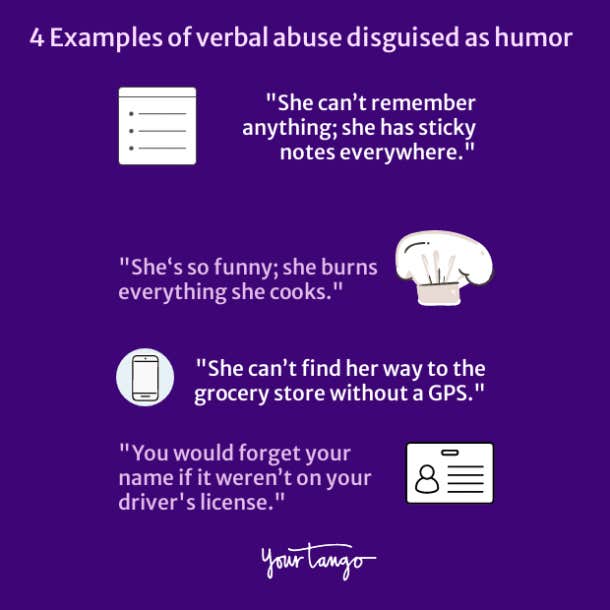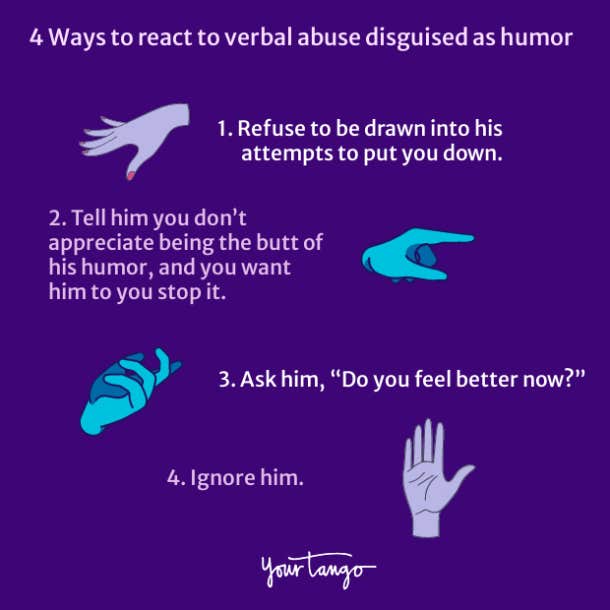
Jokes shouldn't feel like a hard jab to the heart.
By Nancy Nichols — Last updated on Nov 01, 2022
Photo: Sayan Puangkham / Shutterstock

Verbal abuse can begin as small digs disguised as jokes.
Your boyfriend or husband teases, ridicules and humiliates you with sarcastic remarks about your appearance, personality, abilities and values.
If you tell him, “I don’t think that’s funny,” or ask him to stop poking fun at you, he becomes defensive, irritated or angry.
He tells you things like, “You’re too sensitive,” or, “You can’t take a joke.”
How you know it is humor disguised as abuse
His blaming statements are convincing, causing you to question your ability to reason. You wonder if you are overreacting, and you doubt your own perception of his abuse.
In reality, his denial of your experience and invalidation of your emotions only adds another layer to his abuse.
He makes comments about you in front of friends that mock or belittle you. He conceals his acrimony with a smug grin and laughter.
His public ridicule is unexpected. It throws you off balance, and it embarrasses and humiliates you.
Your friends may laugh at his wisecracks, but your heart feels the jabs and your brain struggles to interpret the true meaning of his put-down.
If you show shock or displeasure he may patronize you with a hug and tell you he was only “kidding.” He maintains his good guy façade, and your friends wonder why you are overly emotional about a mindless joke.
Over time his ridicule and put-downs can severely damage your self-esteem, sense of self and integrity.
RELATED: You Can Get PTSD From Staying In An Emotionally Abusive Relationship
As Patricia Evans states poignantly in her book, The Verbally Abusive Relationship, "It takes a quick mind to come up with ways of disparaging the partner either crassly or with wit and style. This kind of abuse is not done in jest. It cuts to the quick, touches the most sensitive areas, and leaves the abuser with a look of triumph."
"This abuse never seems funny because it isn’t funny,” she adds.
I should have paid attention the first time Dr. Dirtbag ridiculed me about my weight.
We were eating dinner in front of the TV, and out-of-the-clear-blue-yonder he said, “Ya know, the reason fat people are fat is they don’t know when to stop eating. Your plate is so clean when you get through eating I don’t even have to wash it.”
I froze mid-bite.
He could see the hurt in my eyes, but instead of apologizing he feigned innocence, saying, “Oh, did I say something wrong?”
He swore he didn’t mean it, but he never apologized. He instead blamed me, saying, “Geez, I was just trying to help. You told me you wanted to lose five pounds. I can’t say anything to you. I’ll just keep my mouth shut.”
His sole purpose was to shock and wound me with his spiteful put-down.
Examples of verbal abuse disguised as jokes:
"She can’t remember anything; she has sticky notes everywhere."
"She‘s so funny; she burns everything she cooks."
"She can’t find her way to the grocery store without a GPS."
"Having a bad hair day?"
"You act just like your mother."
"You would forget your name if it weren’t on your driver's license."
When he says these things to you, he is really saying, "I can say whatever I want to say about you, because I am 'just' being funny."

RELATED: 21 Signs You're In An Emotionally Abusive Relationship
Understand that the sole purpose of his hostile, disparaging humor is to victimize, belittle and insult you.
If you don’t react to his ridicule, he won't be able to control, dominate and power over you.
4 Ways you can stop reacting to verbal abuse disguised as jokes
1. Refuse to be drawn into his attempts to put you down.
Don’t acknowledge his excuses. Do not get into a debate with him.
2. Tell him you don’t appreciate being the butt of his humor, and you want him to you stop it.
And he needs to stop now. Don’t stick around waiting for his reply.
3. Ask him, “Do you feel better now?”
Then leave the room.
4. Ignore him.
Pick up your phone and call a friend. Or take a walk. Or go for a drive.

Related Stories From YourTango:
RELATED: How To Stop Verbal Abuse With One Simple Trick
Get the picture?
Chances are your abusive partner will never change.
But you can take your power back by changing the way you react to his verbal abuse.
If you or someone you know is in an abusive relationship, you are not alone. Domestic, verbal, mental, emotional, and any other form of abuse can happen to anyone and is not a reflection of who you are or anything you've done wrong.
Talk to someone you trust, or contact the National Domestic Violence Hotline by calling 1-800-799-7233, which is available 24/7/365. If you’re unable to speak safely, text LOVEIS to 1-866-331-9474, or log onto thehotline.org.
RELATED: 15 Signs You're Stuck In A Soul-Sucking, Toxic Relationship
More for You:
Nancy Nichols is a motivational speaker and the best-selling author of "Never Date A Dead Animal: The Red Flags of Losers, Abusers, Cheaters and Con-Artists."
This article was originally published at www.knowitallnancy.com. Reprinted with permission from the author.
